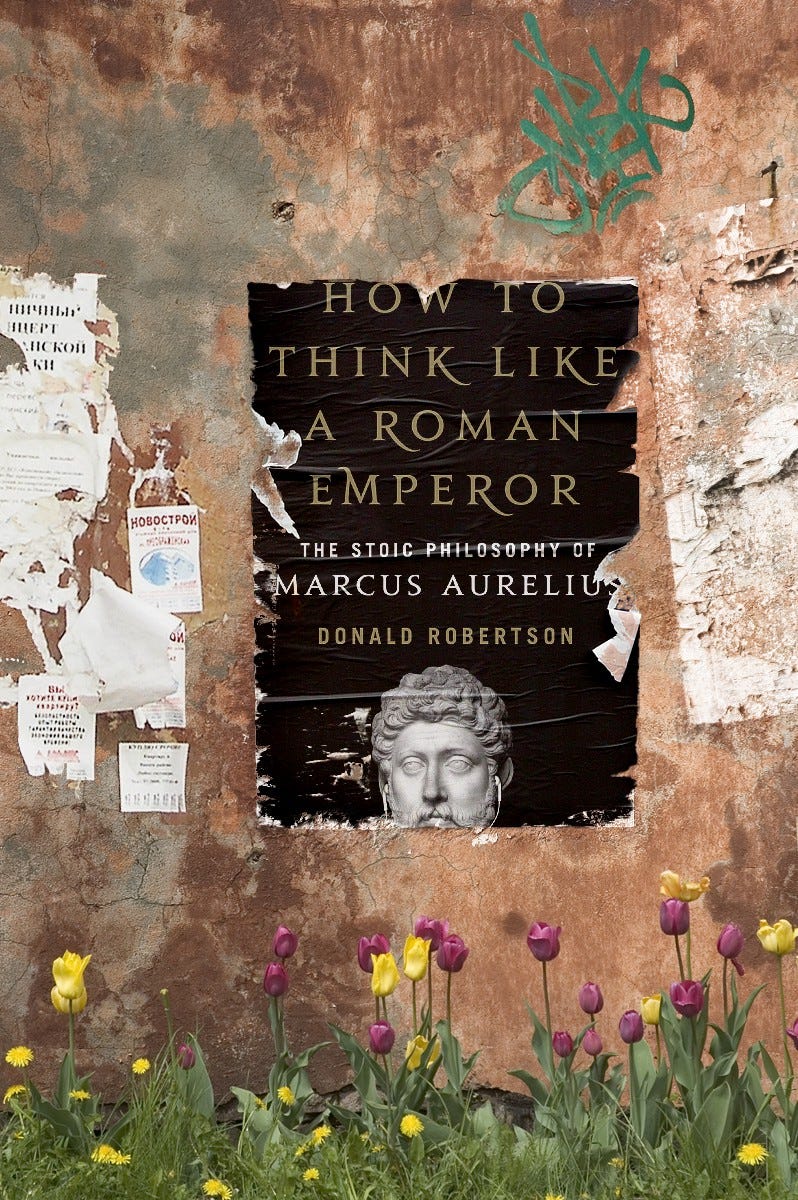The Stoic Philosophy of Marcus Aurelius
Excerpt from How to Think Like a Roman Emperor: The Stoic Philosophy of Marcus Aurelius (2019). Copyright © Donald Robertson. All rights reserved.
This philosophical attitude toward death didn’t come naturally to Marcus. His father passed away when he was only a few years old, leaving him a solemn child. When he reached seventeen, he was adopted by the Emperor Antoninus Pius as part of a long-term succession plan devised by his predecessor, Hadrian, who had foreseen the potential for wisdom and greatness in Marcus even as a small boy. Nevertheless, he had been most reluctant to leave his mother’s home for the imperial palace. Antoninus summoned the finest teachers of rhetoric and philosophy to train Marcus in preparation for succeeding him as emperor.
Among his tutors were experts on Platonism and Aristotelianism, but his main philosophical education was in Stoicism. These men became like family to him. When one of his most beloved tutors died, it’s said that Marcus wept so violently that the palace servants tried to restrain him. They were worried that people would find his behavior unbecoming of a future ruler. However, Antoninus told them to leave him alone: “Let him be only a man for once; for neither philosophy nor empire takes away natural feeling.” After losing several young children, Marcus was once again moved to tears in public while presiding over a legal case, when he heard an advocate say in the course of his argument: “Blessed are they who died in the plague.”
Marcus was a naturally loving and affectionate man, deeply affected by loss. Over the course of his life, he increasingly turned to the ancient precepts of Stoicism as a way of coping when those closest to him were taken. Now, as he lies dying, he reflects once again on those he has lost. A few years earlier, the Empress Faustina, his wife of thirty-five years, passed away. He’d lived long enough to see eight of their thirteen children die. Four of his eight daughters survived, but only one of his five sons, Commodus.
Death was everywhere, though. During his reign, millions of Romans throughout the empire had been killed by war or disease. The two went hand in hand, as the legionary camps were particularly vulnerable to outbreaks of plague, especially during the long winter months. The air around him is still thick with the sweet smell of frankincense, which the Romans vainly hoped might help prevent the spread of the disease. For over a decade now, the scent of smoke and incense had been a reminder to Marcus that he was living under the shadow of death and that survival from one day to the next should never be taken for granted.
Comments
That was an excerpt from the opening chapter of How to Think Like a Roman Emperor, which follows a short introduction about how I came to write the book and my work over the years on Stoicism. It opens with the death of Marcus Aurelius. I wanted to start the book with something dramatic. Each chapter begins with a story about some major event in Marcus’ life, based on the information we have from the various Roman histories of his reign. In most of the chapters that leads into a discussion of Stoic philosophy and psychology and the concepts and techniques he used to cope with various problems such as anger, anxiety, pain, and so on. Then there’s a detailed discussion of how Stoic techniques can actually be applied today, drawing on my experience as a cognitive-behavioural therapist and the relevant scientific research. However, the first chapter is slightly different because after describing the events surrounding Marcus’ death in some detail, it proceeds to give the reader a short introduction to Stoic philosophy — an overview.
The story of Stoicism begins with Zeno of Citium, the founder of the school, and so you’ll be introduced to various anecdotes about him and other famous Stoics. Then we focus on what the Stoics actually believed: the core doctrines of the philosophy followed by Marcus throughout his entire adult life. And we’ll address some common misconceptions about Stoicism, such as the idea that Stoics were unemotional or joyless, which is false. I tried to keep the explanation of Stoicism in this chapter as simple as possible but after reading it you should have a pretty clear idea of who the Stoics were and what they believed. Then you’ll be well prepared to begin delving into the application of Stoicism to different areas of life. For example, in the next chapter we’ll be looking at how Stoics used language and in subsequent chapters you’ll learn how they overcame unhealthy desires and bad habits, conquered anxiety, managed anger, coped with pain and illness, came to terms with loss, and even faced their own mortality.






It is not only the book itself that is beautiful but the tone of the narrator that is what makes the book so appealing. Lessons learned in this book have been enormously helpful. Even grief has moderation.Be strict with yourself but tolerant with others and so much more.